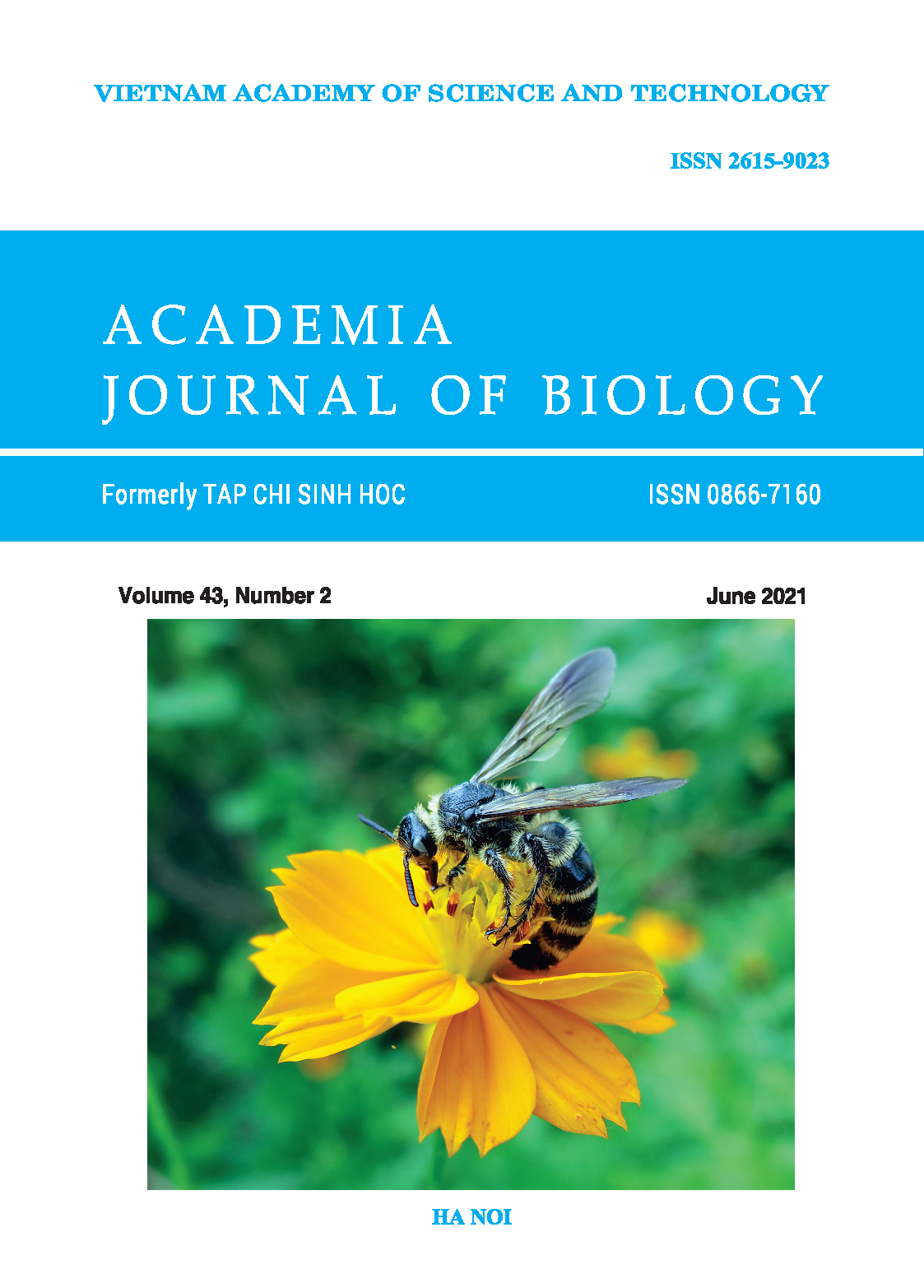The DNA barcodes for the species delimitation of the genus \(\textit{Tylopus}\) Jeekel, 1968 in Vietnam (Diplopoda: Polydesmida: Paradoxosomatidae)
Author affiliations
DOI:
https://doi.org/10.15625/2615-9023/15761Keywords:
Molecular taxonomy, biodiversity, millipedes, COI gene.Abstract
The 680 bp fragment of the COI gene was employed for DNA barcodes of the millipede genus Tylopus in Vietnam. A total of 22 samples representing for 14 morphological Tylopus species were analyzed. The K2P genetic divergence between Tylopus species ranges from 12.2% to 18.9% with a mean of 15 ± 1%. The intraspecific divergences are slightly different between species, from 3% to 5%. The AGBD analysis and phylogenetic trees also support 14 morphological species. It is also suggested to have more COI sequences of more species for better barcode reference library and better molecular species identification.
Downloads
References
Attems C., 1937. Myriapoda 3. Polydesmoidea I. Fam. Strongylosomidae. Das Tierreich, 68: 1–300.
Attems C., 1953. Myriopoden von Indochina. Expedition von Dr. C. Dawydoff (1938-1939). Mémoires du Muséum National d’Histoire Naturelle, {N. S., Sér. A, Zool.}5(3): 133–230.
Enghoff H., Golovatch S. I. and Nguyen D. A., 2004. A review of the millipede fauna of Vietnam (Diplopoda). Arthropoda Selecta, 13(1/2): 29–43.
Golovatch S. I., Enghoff H., 1993. Review of the genus Tylopus, with descriptions of new species from Thailand (Diplopoda, Polydesmida, Paradoxosomatidae). Steenstrupia, 19(3): 85–125.
Golovatch S. I., 1984. Contribution to the millipede fauna of Vietnam (Diplopoda), II. Acta Zoologica Hungarica, 30(1–2): 53–77.
Golovatch S. I., 2019. On several new or poorly-known Oriental Paradoxosomatidae (Diplopoda: Polydesmida), XXVII. Arthropoda Selecta, 28(4): 459–478.
Hall T. A., 1999. BioEdit: a user-friendly biological sequence alignment editor and analysis program for Windows 95/98/NT. Nucleic Acids Symposium Series, 41: 95–98.
Jeekel C. A. W., 1968. On the classification and geographical distribution of the family Paradoxosomatidae (Diplopoda, Polydesmida). Bronder Offset Rotterdam, private.
Kalyaanamoorthy S., Minh B. Q., Wong T. K. F., von Haeseler A., Jermiin L. S., 2017. ModelFinder: Fast model selection for accurate phylogenetic estimates. Nature Methods, 14: 587–589. https://doi.org/10.1038/nmeth.4285
Kimura M., 1980. A simple method for estimating evolutionary rate of base substitutions through comparative studies of nucleotide sequences. Journal of Molecular Evolution, 16: 111–120.
Kumar S., Stecher G., Li M., Knyaz C., Tamura K., 2018. MEGA X: Molecular Evolutionary Genetics Analysis across Computing Platforms. Molecular Biology and Evolution, 35(6): 1547–1549.
Larkin M. A., Blackshields G., Brown N. P., Chenna R., McGettigan P. A., McWilliam H., Valentin F., Wallace I. M., Wilm A., Lopez R., Thompson J. D., Gibson T. J., Higgins D. G., 2007. Clustal W and Clustal X version 2.0. Bioinformatics, 23: 2947−2948.
Likhitrakarn N., Golovatch S. I., Prateepasen R. & Panha S., 2010. Review of the genus Tylopus Jeekel, 1968, with descriptions of five new species from Thailand (Diplopoda, Polydesmida, Paradoxosomatidae). ZooKeys, 72: 23–68.
Minh B. Q., Schmidt H. A., Chernomor O., Schrempf D., Woodhams M. D., von Haeseler A., Lanfear R., 2020. IQ-TREE 2: New models and efficient methods for phylogenetic inference in the genomic era. Molecular and Biological Evolution, 37: 1530–1534. https://doi.org/10.1093/ molbev/msaa015
Nguyen A. D., 2012. Tylopus millipedes in Vietnam (Diplopoda: Polydesmida: Paradoxosomatidae: Sulciferini), with descriptions of five new species. The Raffles Bulletin of Zoology, 60(2): 289–311.
Nguyen A. D., Korsós Z., Jang K. H., Hwang U. W., 2017. A revision and phylogenetic analysis of the millipede genus Oxidus Cook, 1911 (Polydesmida: Paradoxosomatidae). European Journal of Taxonomy, 293: 1–22. https://doi.org/10.5852/ejt.2017.293
Ronquist F., Teslenko M., van der Mark P., Ayres D. L., Darling A., Höhna S., Larget B., Liu L., Suchard M. A. & Huelsenbeck J. P., 2012. MRBAYES 3.2: Efficient Bayesian phylogenetic inference and model selection across a large model space. Systematic Biology, 61: 539–542. https://doi.org/10.1093/sysbio/sys029
Spelda J., Reip H., Oliveira Biener U., Melzer R., 2011. Barcoding Fauna Bavarica:
Myriapoda - a contribution to DNA sequence-based identifications of centipedes and millipedes (Chilopoda, Diplopoda). ZooKeys, 156: 123–139. https://doi.org/10.3897/zookeys.156.2176
Wesener T., 2015. No millipede endemics north of the Alps? DNA-Barcoding reveals Glomeris malmivaga Verhoeff, 1912 as a synonym of G. ornata Koch, 1847 (Diplopoda, Glomerida, Glomeridae). Zootaxa, 3999(4): 571–580. https://doi.org/10.11646/zootaxa.3999.4.7
Zhang Z., Schwartz S., Wagner L., Miller W., 2000. A greedy algorithm for aligning DNA sequences. Journal of Computational Biology, 7(1–2): 203–214.
Zhao Y., Yu J. & Liu W., 2020. A molecular-based phylogeny of the millipede genus Sphaerobelum Verhoeff, 1924, with the first record of the genus from mainland China (Diplopoda: Sphaerotheriida: Zephroniidae). Annales de la Société entomologique de France (N.S.), 56(4): 341–348. https://doi.org/10.1080/ 00379271.2020.1811153
Downloads
Published
How to Cite
Issue
Section
License
Academia Journal of Biology (AJB) is an open-access and peer-reviewed journal. The articles published in the AJB are licensed under a Creative Commons Attribution-NonCommercial-NoDerivatives 4.0 International License (CC BY-NC-ND 4.0), which permits for immediate free access to the articles to read, download, copy, non-commercial use, distribution and reproduction in any medium, provided the work is properly cited (with a link to the formal publication through the relevant DOI), and without subscription charges or registration barriers. The full details of the CC BY-NC-ND 4.0 License are available at https://creativecommons.org/licenses/by-nc-nd/4.0/.












